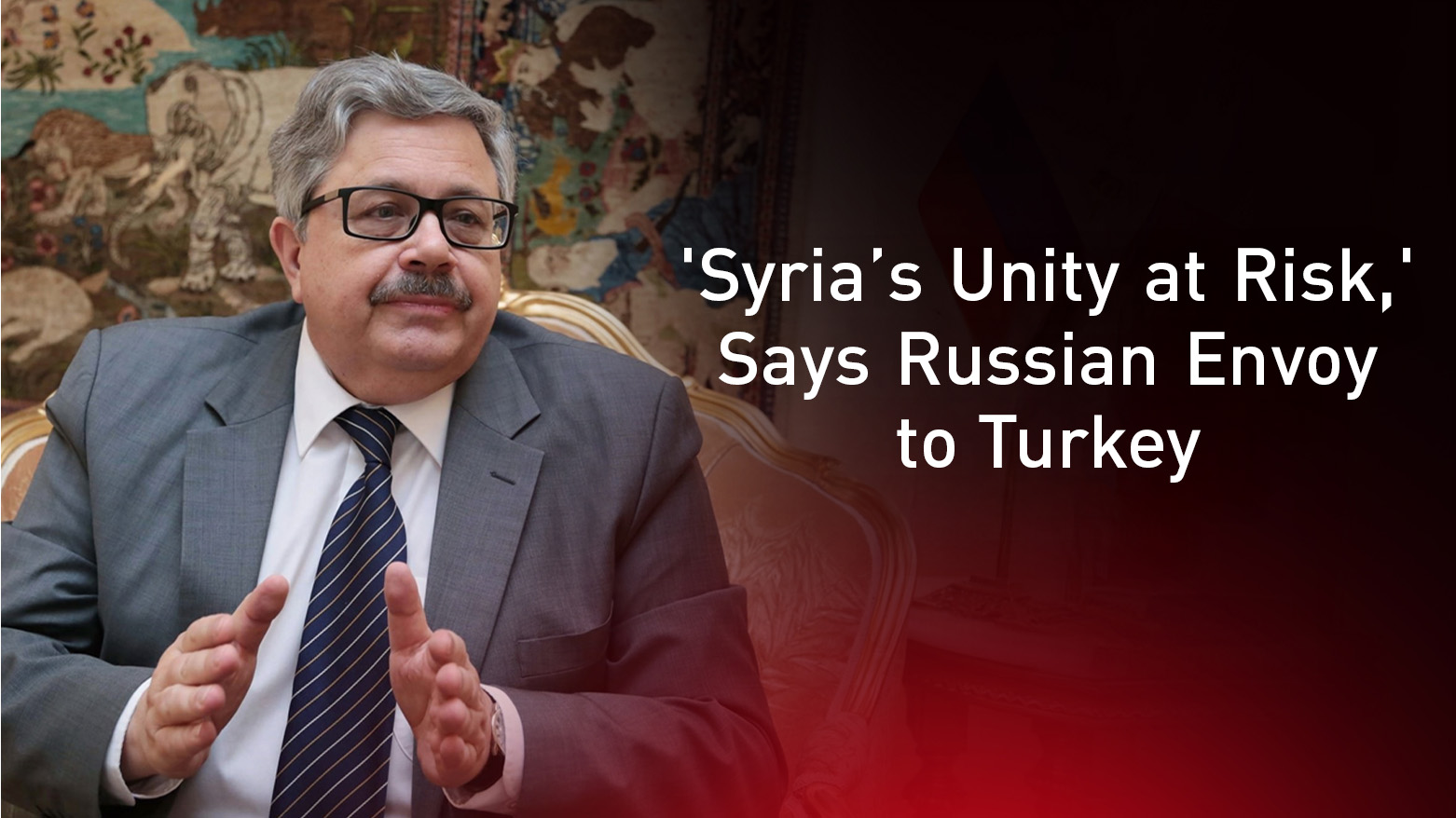'Syria’s Unity at Risk,' Says Russian Envoy to Turkey
Russian Ambassador to Turkey Alexei Yerkhov stated on Tuesday that "Syria's unity is at risk" and emphasized that Moscow is prepared to contribute to efforts aimed at stabilizing the country.

By Kamaran Aziz
ERBIL (Kurdistan24) — Russia has issued a stark warning over the deteriorating unity of Syria, amid growing sectarian tensions, internal unrest, and repeated Israeli airstrikes. The remarks by Moscow’s top diplomat in Ankara mark one of the clearest public acknowledgments by a key international player of Syria’s deepening fragmentation and internal volatility.
As reported by Russia Today in the Arabic language, Russian Ambassador to Turkey Alexei Yerkhov stated on Tuesday that "Syria's unity is at risk" and emphasized that Moscow is prepared to contribute to efforts aimed at stabilizing the country. He warned that “the situation in Syria is extremely complex, and I will not say that it is improving.”
Yerkhov further elaborated that Israel has expanded its control over parts of southern Syria and continues to bomb Syrian Arab Army positions. “Those sites and weapons belonged to Bashar al-Assad and his army,” he noted. He also highlighted ongoing tensions among Syria’s sectarian communities, referencing violent episodes that occurred in March along the coast—including in Latakia, Tartus, and parts of Homs—as well as recent unrest in southern Syria involving the Druze population.
“There is now a clear division in Syria, and this division may increase further,” Yerkhov added, noting the necessity of stabilizing Syria’s internal political situation, preventing renewed violence, and investing in the reconstruction of infrastructure, economy, and social cohesion.
His comments follow a turbulent week in Syria, where escalating sectarian violence and cross-border attacks have stirred fears of further fragmentation in the already war-torn country. On Sunday, Israeli warplanes bombed a site near the Presidential Palace in Damascus, provoking outrage from Syrian officials.
The Syrian Presidency quickly issued a statement condemning the airstrike, labeling it a blatant breach of international law and sovereignty. It also called upon the international community and the Arab League to take a firm stand in support of Syria’s right to defend itself against foreign aggression.
The Israeli strike came on the heels of deadly clashes in southern Damascus between Druze communities and armed groups. At least 20 members of Syrian security forces were reported killed in the violence. The clash, reportedly rooted in sectarian tensions, is the latest in a string of events that signal rising volatility within Syria’s already fragile sociopolitical landscape.
Tensions began flaring on April 28, when a confrontation erupted at a university in Homs. A voice message circulating on social media allegedly disrespected the Prophet of Islam and was attributed to a Druze student, sparking outrage and retaliatory narratives that fueled communal strife.
Observers warn that these developments point to a dangerous unraveling of Syria’s post-war fabric. Russia’s alarm over Syria’s territorial integrity comes after years of efforts to broker a political solution through the Astana peace process, in which Moscow has played a central role alongside Turkey and Iran. Yet with foreign powers including Israel continuing to exert military pressure, and internal fault lines deepening along ethnic and sectarian lines, the future of a unified Syrian state appears increasingly uncertain.
Ambassador Yerkhov stressed that without stabilizing Syria’s internal politics and halting violent flare-ups like those in Latakia and Tartus, it will be “impossible to arrange normal life in the country.” He reiterated that Russia is “ready to contribute positively” to reconstruction, peacebuilding, and societal reconciliation.
Russia’s renewed call for unity reflects Moscow’s strategic interest in preserving the Syrian state structure. However, critics argue that geopolitical rivalries, external interventions, and unresolved grievances among Syria’s diverse communities continue to undermine efforts toward sustainable peace.
As the region braces for the potential fallout from Syria’s worsening divisions, calls for renewed international diplomacy have grown more urgent. Whether such efforts can keep pace with the fast-evolving on-the-ground dynamics remains to be seen.
